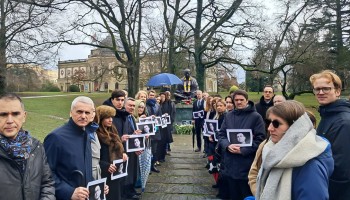The European Commission will look for ways to strengthen its alert system in response to an OCCRP investigation that identified more than 100 doctors who lost their medical license for serious wrongdoing in one jurisdiction but are licensed to practice in another.
In some cases, the doctors were banned for sexual abuse of patients, for botched medical treatments, and even for intentionally misdiagnosing children as having cancer, for personal gain.
Norwegian representatives who participated in a European Commission meeting last week raised the issue of the Commission’s Internal Market Information (IMI) system, used to notify European authorities in 30 member states of disciplinary actions regarding doctors.
The Commission “responded that they would look into possible regulatory solutions as we had suggested,” a spokesperson for Norway’s Ministry of Education and Research told OCCRP’s Norwegian partner VG. A spokesperson for the European Commission declined to comment on internal discussions.
Issues with the IMI system were flagged last year by European Commission auditors who found that recipients were overloaded with IMI alerts, and there was confusion about definitions and standards for reporting warnings.
Reporters found that the alert system was barely or never utilized by some European countries. Malta, Greece, Liechtenstein and Estonia, have filed zero alerts since requirements to do so came into force in 2016 (Malta also had zero revocations). Ten countries filed fewer than 10 alerts. Moreover, authorities confirmed to reporters that incoming alerts were difficult to access.
“It is not possible to identify which specialist is being referred to from the received electronic notification,” the head of Lithuania’s healthcare accreditation authority Eglė Savulienė told OCCRP’s Lithuanian partner 15min.
“In order to review the information, I have to go to the identification number indicated in each letter. We simply do not have enough human resources to review everything every day," she added.
Reporters reviewed the alerts, confirming that incoming messages contain minimal information and require follow-up actions for substantive information.
In raising the findings of the investigation to the European Commission, the Norwegian delegation “proposed including more information about the reasons for loss of authorization in the notification itself,” according to the statement obtained by VG.
Reporters who worked on the Bad Practice investigation also found that local authorities in multiple cases either didn’t read, disregarded or failed to follow up on IMI warnings.
In response to the journalistic findings, the Norwegian Board of Health Supervision reopened dozens of investigations into licensed doctors, and has since notified nine physicians of immediate suspension or revocation, VG has confirmed. One of the cases involves a Swedish doctor who put a patient's breast in his mouth in the emergency room of a Swedish hospital, according to disciplinary documents. The supervisory board has apologized for its handling of the case.
In the United Kingdom too, authorities are lobbying for the European Network of Medical Regulatory Authorities to provide more comprehensive information on licence revocations from EU states, according to OCCRP’s U.K. project partner The Times.
A spokeswoman for the General Medical Council, the body that regulates doctors in the United Kingdom, told The Times it would be “taking steps to tighten our registration checks and pushing for better international information sharing to stop doctors from hiding overseas sanctions.”
“This includes piloting tougher verification through specialist providers and pressing global regulators to share information more openly and consistently,” she added.
An earlier version of this article stated that 13 doctors received notifications, according to the Norwegian supervisory board’s report. After publication, the board corrected its number to nine. The story has been updated to reflect this.






